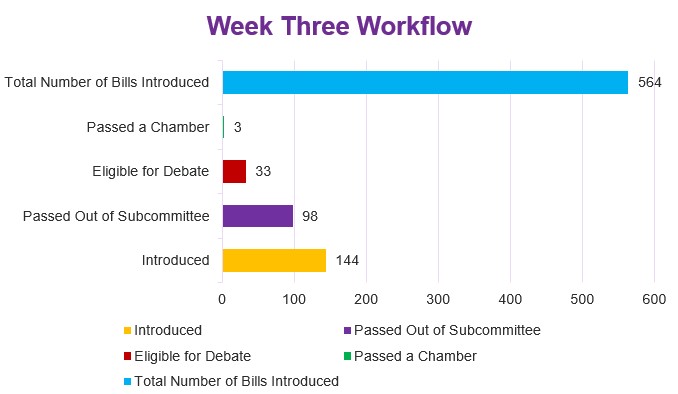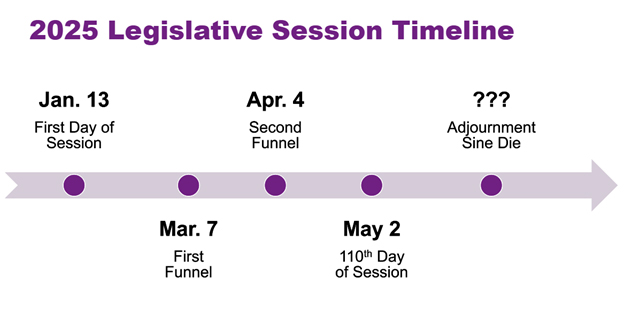The 91st General Assembly reconvened at the Capitol for a full week of legislating. Last week, there were 144 new bill introductions between both chambers, and 90 bills passed out of subcommittee. Currently, 33 bills have passed out of committee and are eligible for floor debate. Three bills passed the House last week, and the Senate has yet to take any floor action.

Legislators have until February 14 to request bill and joint resolution drafts to the Legislative Services Agency (LSA), so the number of bill introductions will continue to increase.
Special Election
Last Tuesday, Senate District 35 flipped blue when Democrat Mike Zimmer became Iowa’s newest state senator, filling the vacant seat left by the appointment of Lieutenant Governor Chris Cournoyer. Zimmer, president of the Central DeWitt School Board, secured 52% of the vote to Republican activist Katie Whittington’s 48%. By comparison, Cournoyer won this senate seat in 2022 with 61% of the vote. Senator-Elect Zimmer will be sworn in within the next two weeks and will serve through 2026.
Governor Reynolds’ Legislative Priorities
Three of Governor Reynolds’ expressed priorities in her Condition of the State at the start of session saw movement within the past week.
Paid Family Leave
After being introduced at the end of week two, the Governor’s Families First Bill (HSB 78/SSB 1040), which would provide paid parental leave for state employees, passed out of subcommittee in both chambers. Two proposed Governors’ bills were introduced at the end of week three: a cell phone ban in schools and unemployment insurance reform.
Cell Phones in Schools
HSB 106 and SSB 1065 are bills for an act relating to electronic devices in schools, including student access during instructional hours, school safety plans, and instruction related to the effects of social media in grades six through eight, including effective date provisions. If passed, these bills would effectively ban schools from allowing students to use their cell phones during instructional time. This is a minimum standard for school districts to abide by, and it includes a provision to require training on the effects of social media on students in 6th–8th grade.
Unemployment Insurance Reform
Furthering the Governor’s goal of unemployment insurance reform, HSB 144 is a bill for an act relating to unemployment insurance taxes on employers. If passed, this bill would reduce the maximum unemployment tax rate to 5.4%, which is the lowest allowed by federal law. Additionally, the bill would reduce the number of tax tables, simplifying the unemployment insurance system. In a press release, Governor Reynolds stated:
“Iowa is overdue for an overhaul of our unemployment insurance system… Our trust fund balance sits near a record high $2 billion, while unemployment claims are at a record low length of nine weeks. We need to stop over-collecting on Iowa employers and allow them to reinvest savings in their businesses and employees. A simplification of the system is necessary to maintain our momentum in state tax reform and ensure we stay competitive with surrounding states.”
As of publishing, this bill does not yet have a Senate companion.
Casino Moratorium
In less than one week, the Iowa Racing and Gaming Commission will meet on February 6 to discuss granting a gaming license for a proposed Cedar Rapids casino. However, legislation is moving quickly through both chambers that would impose a moratorium on new casino licenses through June 30, 2030, effectively halting the development of the $275 million proposed Cedar Crossing Casino and Entertainment Center. HF 144 passed with an amendment in the House on Thursday afternoon by a vote of 68-31. As of drafting, the Senate companion, SSB 1069 has yet to be renumbered and will need to be debated on the Senate floor and signed into law before the February 6 deadline to halt the Commission.
What’s next?
This week, the legislature will be back for another full week. The Senate is expected to see action on the casino moratorium early in the week. Meanwhile, bill introductions and subcommittee and committee meetings continue in both chambers as more bills become eligible for calendar placement and floor debate. The first major milestone of the 2025 legislative session is in two weeks, marking the deadline for legislators to request bill drafts and joint resolutions.

The full 2025 Session Timetable can be found here.


